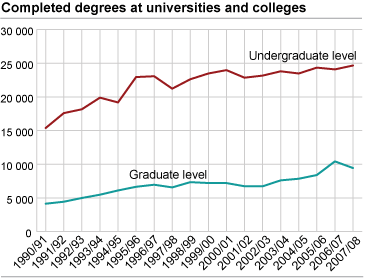Content
Published:
This is an archived release.
Less females completed tertiary education
Less females completed tertiary education for the first time in several years in 2007/08. Fewer tertiary degrees were completed in particular in the field of Health, welfare and sport, but the number remained stable in Science. Forty-five per cent of doctoral degrees were awarded to women.
Approximately 34 100 tertiary degrees were completed by students in 2007/08; a fall of 400 graduations compared with 2006/07. The drop is explained by a declining number of females who completed tertiary education. The number of men completing a tertiary degree has been growing since 2004/05 , whereas women faced a decline for the first time since 2001/02.
More than 24 600 undergraduate degrees were completed in 2007/08; an increase of 600 compared with the year before. Graduations from graduate degrees decreased by a thousand from 2006/07 to 2007/08 - from 10 400 to 9 400. The decrease is mainly explained by a pronounced increase in 2006/07, as many students graduated according to the previous degree structure - before six years tertiary graduate degrees became five year Master degrees and before the full implementation of the Bachelor-Master structure.
|
Undergraduate degrees in tertiary education include programmes of four years or less, but at least two years. Graduate degrees have a cumulative duration of more than four years, but doctoral degrees are not included. |
Fewer graduations in Health, welfare and sport
Fewer female graduations had the greatest impact in the field of Health, welfare and sport. Almost 400 less graduations were awarded to women in this field of education in 2007/08 compared with 2006/07. The largest increase was in Business and administration. In Science, there were 120 less graduations at undergraduate level but the number remained stable at graduate level.
A total of 84 and 72 per cent of the graduations from Health, welfare and sport and Teacher training and pedagogy respectively were awarded to women in 2007/08. There was a similar majority of men in the fields of Science and Transport and communications, safety, security and other services - 74 per cent in both fields.
Large increase in doctoral degrees awarded
A total of 1 231 doctoral degrees were awarded in 2007/08; an increase of 251 or 25 per cent from the year before. One out of four doctoral degrees were awarded to foreign citizens. The Norwegian Institute for Studies in Innovation, Research and Education (NIFU STEP) publishes more detailed statistics on doctoral degrees at a national level, and NORBAL produces PhD statistics for the Nordic and Baltic countries.
Tables:
- Table 1 Graduations in tertiary education, by level of degree, type of institution and gender. 1997/98, 2006/07 and 2007/08
- Table 2 Graduations from first degree programmes in tertiary education, by gender and field of education. 1997/98, 2006/07 and 2007/08
- Table 3 Graduations from second degree programmes in tertiary education, by gender and field of education. 1997/98, 2006/07 and 2007/08
- Table 4 Awarded doctoral degrees, by field of education and gender. 1997/98, 2006/07 and 2007/08
Contact
-
Beate Bartsch
E-mail: beate.bartsch@ssb.no
tel.: (+47) 40 81 14 96
-
Nawid Fazli
E-mail: nawid.fazli@ssb.no
tel.: (+47) 97 09 77 18
-
Geir Nygård
E-mail: geir.nygard@ssb.no
tel.: (+47) 48 15 13 44

